

  
 
Democratic National Committee Winter MeetingWashington, DC, Feb 12, 2005
|
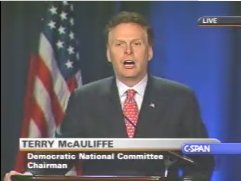 |
McAuliffe: That concludes the nominating and seconding speeches for Governor Dean. We are about to move to a vote. At this time, the Chair would accept a motion to suspend the rules and elect Governor Howard Dean as Chair of the Democratic National Committee by acclamation.
[Someone shouts from the audience]
McAuliffe: So moved. Is there a second?
[Several voices are heard shouting their seconds]
McAuliffe: Any discussion? All those in favor of the motion signify by saying 'aye'.
Audience: Aye!
McAuliffe: Any of those nays?
[Silence]
McAuliffe: [Bangs his gavel on the podium] Howard Dean is elected Chair of the Democratic National Committee!
[Audience rises, cheering, to give a standing ovation]
McAuliffe: Ladies and gentlemen, let's hear it for Governor Dean!
[Many members of the audience vigorously wave little flags, as others chant, "Dean! Dean! Dean!"]
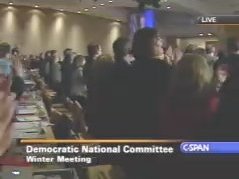
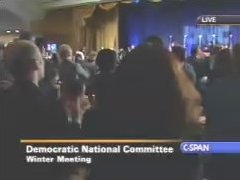
[Dean walks up onstage and greets all the members of the DNC leadership with smiles and hugs, as the audience continues to cheer. Then he returns to the podium, with McAuliffe standing alongside.]
Dean: [To audience] Thank you! Thank you. [repeated several times, hardly audible over the audience.]
Dean: Thank you. My goodness!
[Audience finally quiets.]
Dean: Thank you very much.
Someone in Audience: Thank you Howard!
[Dean chuckles. There are several cheers and whoops from the audience.]
Dean: Well, if you had told me a year ago that I'd be standing here doing this as your choice for Democratic-- Chairman of the National Committee, I would not have believed you-- and neither would a lot of other people.
I really want to thank you for the opportunity to lead this party. It is an extraordinary honor and I'm very thankful and grateful. I'm humbled, and I'm ready to go to work.
This... this is the first race for Democratic National Committe Chair truly driven by the grassroots of the party. And I--
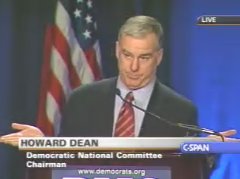 |
I want you to know that this is not my Chairmanship. It is our chairmanship.
You've given me enormous responsibility, but it's a responsibility that we share. We can change the party, but only by working together and competing in all 50 states and territories. We can change the party, but only by working together and becoming a national party again. We can change this party, but only by working together at the local level, because if we want to win nationally we have to start by winning locally.
With your help, I'm certain that today will not mark the end of the process of selecting a DNC chair; today will be the beginning of the reemergence of the Democratic Party.
We have a lot of work to do. We have a bright future, exemplified by other candidates, the other candidates who had joined me in this race, and I want to thank all these great Democrats for having competed, 'cause I learned something from every one of them. [Points to someone off camera] I thank you [inaudible-- "wes"?]
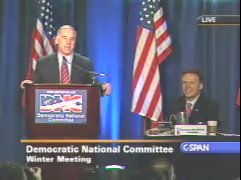 |
[speaks slowly and emphatically] And I want to thank Terry McAuliffe. He has given this party so much, every waking day for the past four years of his chairmanship, and he's given us something else. A party in strong financial shape, with an infrastructure to meet the challenges of the future. This is no small gift.
I can't tell you how ironic it is for us to be side by side two years later, and me telling you that I have learned a great deal from a man I am proud to call my friend, and every Democrat in this room owes an enormous debt to Chairman Terry McAuliffe. Thank you so very much.
[Applause. McAuliffe gets up from his chair and he and Dean shake hands warmly.]
Dean: We're gonna build on his work. Among the first things I will do is to establish a budget and finance committee that's inclusive.
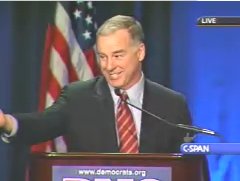 |
I want to thank others as well. Most important, my family-- I would not be here, not only without their support, or their belief in a more just and fair America. And I want to thank my wife Judy for her patience, and her love, and she is here today. Judy, would you please stand and be recognized?
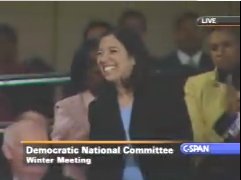 |
[There are cheers and applause. Judy stands up briefly, smiling bashfully, then goes to sit right back down again.]
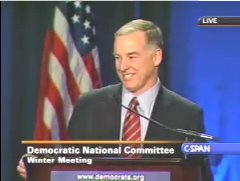 |
Dean: [coaxingly] Stand up.
[Judy stands back up, smiling broadly. The audience comes to their feet as they continue to applaud her.]
Dean: And I also want to thank all the incredibly hardworking people who worked in the campaign. This was a much bigger deal than I realized it was when we started out. And I want to thank all those folks who worked so hard in the campaign for DNC Chair as well.
We know that we're the party of the big tent and the new idears in this country. We know that we're the party for young Americans looking for a government that speaks to them. We know that we're the party for working Americans desperate for a government that looks out for them. We know that we are the party for older Americans and veterans and members of the armed services expecting and deserving a government that honors them.
And we know that no matter where you live, or who you are, or what you look like, or how you worship, that ours is the diverse party that welcomes all Americans.
But right now, as important as all of that is, it's not enough. We have to move forward. We cannot win if all we are is 'against' the current President and his Administration. Republicans wandered around in the political wilderness for 40 years before they took back Congress. But the reason that we lost control is because we forgot why we were entrusted with that control in the first place.
The American people cannot afford to wait for 40 more years for us to put Washington back to work for them. It cannot take us that long. And it won't take us that long, not if we stand up for what we believe in, organize at the local level and recognize that this party's strength does not come from the consultants down, it comes from the grassroots up.
The first thing we have to do is stand up for what we believe in. This week the Republicans introduced a 2 1/2 trillion budget that deliberately conceals the cost of their fiscal recklessness. The budget does not account for the cost of the war in Iraq. It does not account for their agenda of privatizing Social Security. It cuts education, cuts children's health, cuts veterans' benefits, and cuts community policing, and as far as I'm concerned this budget does two things. It brings Enron-style accounting to the nation's capitol...
Dean: ...and it demonstrates once again that what Americans-- all Americans are now beginning to see-- you cannot trust Republicans with your money.
The Republicans know the America they want, and they are not afraid to use any means to get there. But there is something that this Administration and the Republican Party are very afraid of. It is that we may actually begin fighting for what we believe-- fiscally responsible, socially progressive values for which Democrats have always stood, and fought. We are what we believe.
Democrats believe in fiscal responsibility and we are the ones who have delivered it. The first time that our nation balanced its budget, it was Andrew Jackson, the founder of the Democratic Party, who did it, and the last time the nation balanced its budget, it was Bill Clinton who did it--
Dean: --Democratic governors do it every single year. Not one Republican President has balanced a budget in nearly 40 years. Borrow and spend, borrow and spend, borrow and spend-- Americans cannot trust Republicans with taxpayers' money.
Americans want a strong and smart national security policy. It was the Democrats who pushed to create a Department of Homeland Security. It was the Democrats who pushed to make our airlines safer. It is the Democrats who are now looking to make sure that we close the remaining gaps in our security. It was the Democrats who demanded reform of the intelligence community, and it is the Democrats who are pushing for a foreign policy that honestly deals with the threats of today and the threats of tomorrow, such as securing nuclear materials around the world. Republicans had to be dragged kicking and screaming to our side on all these issues. There is no reason for Democrats to be defensive on national defense.
We believe that a good job is the foundation for a strong family, a strong community, and a strong country. We're going to work to create good high-paying here in America, but we are going to keep those high-paying jobs here in America.
And there no reason, ever, for us to apologize for being willing to stand up for our belief that Americans who get up and go to work every single day have the right to join a union.
We believe that every American ought to have access to affordable health care. It is wrong that we remain the only industrialized nation on the face of the earth that does not assure health for all its citizens, particularly our children.
And I am so proud of Democratic Governors who have advanced health care to many, many children in their states. It is one of the biggest differences between Republican governors and Democratic governors in this country, if you look at the number of kids who have health insurance. We can and will do better than that, particularly with 38 governors' races up in 2006. We're gonna take back those state houses and get health insurance for our kids.
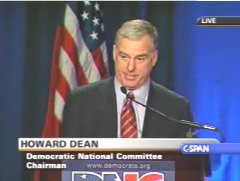 |
We believe that the path to a better future goes directly through the public school system. We believe that every American has a voice and that it should be heard in the halls of power every day. And we believe that it ought to be heard by guaranteeing open and fair elections on [pointedly] Election Day.
And we believe that a lifetime of work earns you a retirement of dignity. We will not, we will not, let that be put at risk by leaders who continually invent false crises to justify policies that don't work.
In this case, borrowing from our children and shredding our country's social safety net in the process. The President's plan does nothing to ensure Social Security's future. But it will cut benefits. And it will cost an estimated two trillion dollars.
According to the Center On Budget and Policy Priorities, the American people will have to borrow 4.5 trillion dollars to finance the privatization of Social Security in the first 20 years alone. Most Americans, of course, have never seen anything like $2 trillion, so let me give you a sense of how much money that is. There are 118 million people in America under the age of 30. That means borrowing nearly $45,000 in each of their name, and that is a legacy of debt that our children do not deserve.
Social Security is one of the most-- one of the proudest achievements of the Democratic Party, and we will not let it fall victim to a dishonest scheme that only serves to heap greater debt on our children. We will not do that.
Democrats will set the agenda. We're gonna work very closely with Harry Reid and Nancy Pelosi, and our Democratic governors and local officials to do exactly that. I met with Speaker-to-be Pelosi and Leader-- -- and Majority Leader-to-be Reid this past week, and we're looking forward to standing shoulder-to-shoulder in the battles ahead. We are gonna need to be united, and we need to be organized. Really organized. We frame the issues. The Republicans will not tell America what the Democratic agenda is, we will do that.
Organizing means raising money not just from big donors but small contributors, not just through dinners and telephone solicitations and direct mail but through Internet and person-to-person outreach. Organizing means transforming us into a party that can communicate with all supporters and all Americans. Because all Americans are potential supporters of what we believe in. Politics is at its best when we create and inspire a sense of community. The tools that were pioneered in our campaign, like blogs and MeetUps and community-building, are just a start. We're gonna use the power and potential of technology as a part of an aggressive outreach to meet and include voters. To work with your state parties and get our unified message out. We can't run 18-state Presidential campaigns and expect to win. You know we have a strategy...
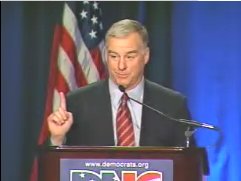 |
...You know we have a strategy for every state and territory, and it's very simple. Show up.
People will vote for Democrats in Texas and Utah and West Virginia if we knock on their door, introduce ourselves, tell them what we believe and that is what organization allows us to do.
All the idears in the world won't matter if people don't see our idears as relevant to them, or the political process as connected to them. So we're gonna recognize that our strength does reside in the communities. [If] we're gonna take our country back for everyday working Americans, Democrats will have to match or exceed Republican ability to motivate voters.
[Archly:] Now you may find this hard to believe, but I am not much of a Zen person. I have found, however, that the path to power is to trust others with it. There have been a lot of things written about our campaign for President, and many things copied by other campaigns. The one thing they didn't copy is the one thing we can offer. We can empower people at the local level, give them the authority to make decisions, and to do the right thing. Trust them. If you trust voters, they will trust us. And the Republicans will never, ever be able to do that.
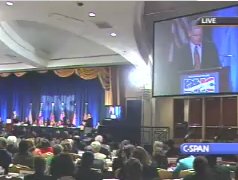 |
Standing up for our beliefs, organizing, and transforming our party into grassroots organizations that can win everywhere. That's how we'll rebuild this party. We will rebuild this party because we are the party of reform and change. Republicans can stop progress, but only Democrats can start it again. We will build our party because our greatest strength is something the Republicans cannot and never will match-- the extraordinary diversity represented in this room.
Look around. We look like America. We are America.
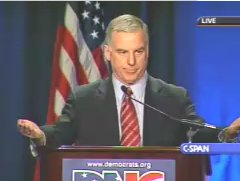 |
Republicans stop progress, Democrats start progress. It is gonna take a lot of work, and I'm gonna be asking for a lot from all of you. This is not my Chairmanship, this is our chairmanship.
Election by election, state by state, precinct by precinct, door by door, vote by vote, year after year, we are gonna take this country back for the people who built it.
Thanks very much.
[Standing ovation. McAuliffe joins Dean behind the podium and they wave and smile.]
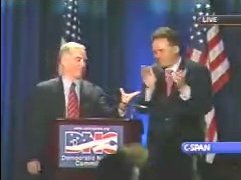
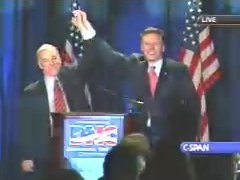
[Terry McAuliffe stays and runs the remaining DNC officer elections so that Governor Dean can do other business.]
 Press Conference With Howard Dean
Press Conference With Howard Dean 
Narrator: Immediately following the Chairman's speech, Howard Dean held a news conference to talk about his initial plans. He met with reporters for about ten minutes.
[Dean enters. Walking up to the podium, he looks over the room full of reporters.]
Dean: That's more people than I've seen in about two years.
[some chuckles from the reporters]
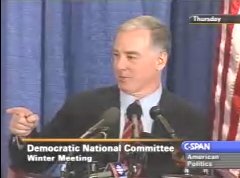 |
[Someone claps. Dean chuckles and gestures toward them]
Dean: True Democratic-- this must be one of the bloggers over there, right?
[more chuckles]
Dean: I'm happy to take que-- I don't have an opening statement. Speech speaks for itself. [pointing to a reporter] Sure.
Reporter #1: [inaudible] Mr. Chairman [inaudible]
Dean: [inaudible] No, that's fine.
[Laughter]
Reporter #2: You seem more subdued...
[Dean and the other reporters laugh]
Dean: It would be hard to be less subdued, wouldn't it?
Reporter #2: [inaudible] even when you were campaigning for the Chairmanship, this stylistically a new you, [inaudible]?
Dean: Ah, I don't do... as I said, I'm not a Zen person, it's hard to answer "stylistic" questions. I-- you know, I am who I am, and... I suspect we'll see a fair amount of each other, so you, you'll just have to figure that one out for yourself. It's not intentional.
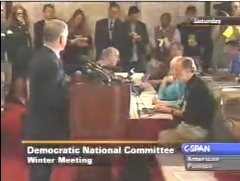 |
Reporter #3: Governor.
Dean: Yeah.
Reporter #3: Governor, a lot of the DNC members say that what sealed the deal for them with you was your pledge not to run in 2008...
Dean: Mm hm.
Reporter #3: Did you get that sense as you went along, that that was the deal-sealer in a lot of ways?
Dean: I actually didn't get that sense, but I didn't poll the DNC members about why they were supporting us, and I am not gonna run in 2008. So, [shrug] I don't-- I can't tell you what was in the mind of every DNC member when they decided to support me. [Points to a reporter]
Reporter #4: Governor, you said that you will pick a diverse transition team, and that we'll see you [inaudible] talk. Are you going to put an evangelical Christian on your transition team?
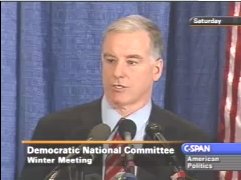 |
Dean: You know that's a good question. We haven't gotten that far yet, but we are definitely gonna be doing religious outreach and... I have for a long time, even when I was running for President, had an interest in reaching out to the evangelical community. There are evangelicals who were involved in our campaign-- my campaign for President. There are evangelicals who consider themselves Democrats, some of whom I am personally acquainted with, and others I know by reputation. So we will definitely seek to reach out, based on the deep moral principles of the Democratic Party, to the evangelical community. [Points to a reporter]
Reporter #5: How do you expect Governor, to go more into the-- outside of the evangelicals-- more into the South, and to the West, and make that a part of your campaign?
Dean: Well, I think that I will pretty much be-- to the extent that this job is on the road, and Terry's told me most of it is on the road, I think I'll probably be living in red states in the South and the West for quite a while. I think that's where we need a lot of work. I think that's where the people are who are most sceptical about the Democratic Party, and I think the way to get people not to be sceptical about you is to show up and talk. And say what you believe. I have a lot of experience with that as a governor in most rural-- the most rural parts of America, and I think we need to do that nationally. [Points to a reporter]
Reporter #6: Governor, President Bush in his radio address today said that Social Security will be bankrupt by 2042. Isn't the federal government bankrupt also by that definition, and do you agree with Newt Gingrich that this issue could cost the Republicans the Congress?
Dean: Well, I hope something costs the Republicans the Congress. [chuckles slightly] I mean, that's what we're all trying to do here.
You know, I think that... first of all, I think that the President misspoke. The Social Security system actuarily is not going to be bankrupt by 2042, and I've never seen an estimate that said it was. It will, eventually at some point-- As a matter of fact, theoretically, if the trust funds run down, you could pay for, I think it's about 70 or 80% of the benefits out of the general fund. Now, I don't advocate doing that. But that's the kind of language that I think inflames the debate unnecessarily. We need to do something about Social Security. It is not borrow $2 trillion.
The privatization aspect of the President's plan does absolutely nothing to increase the longevity of Social Security. So I think we oughtta get that off the table right away, get the ideological piece out of this discussion, and then the leaders of the Congress have indicated that they might be willing to sit down-- the Democratic leaders in the Congress. But right now, I think the President's headed in exactly the wrong direction and that's what the leadership thinks as well.
Reporter #7: Governor, do you believe that the message you've been talking about, which is not-- it was not successful in November, is successful in the West and South and red states if you just go, say knock on their doors?
Dean: You know, I think that if we have a very clear message, then people will understand what Democrats believe in, and frankly, I believe more Americans are aligned with the beliefs of the Democratic Party than they are with the beliefs of the Republican Party. So I think a lot of it is clarity of message and it's organization.
Look, we did the best job-- I think the Democrats did the best job in this past campaign, of any campaign I've known since I've been in politics. And as everybody's fond of saying, John Kerry got more votes than anybody in the history of America, except for George Bush in the same year. Now what that means is, we really did do an incredible job, outraising the Republicans... The advantage the Republicans have organizationally is no longer money, it's their ability, where we bring in people from elsewhere to knock on doors, they have people there who've been in place for 20 years knocking on doors. That is what we have to build, and it's gonna be hard work. There's a lot ahead of us. But I think that's what we have to build.
Reporter #8: [crosstalk] is your wife going to maintain her practice in Vermont, are you going to --
Dean: Yeah, we're gonna live in both pla-- I'm gonna live in both places, and she's gonna continue to practice. Although I, as Terry told me, [ruefully] this job I think I'm mostly gonna be living in motel rooms around America. But I... I have made arrangements-- I think-- I'll be testing it tomorrow night-- I think I have a place to stay in Washington, and I'll maintain my voting residence in Vermont.
Reporter #9: Governor Dean, there are Democrats in several states that you're going to be visiting, who are afraid of your image, and don't want you to visit. What do you say to those Democrats?
 |
Dean: Well, I actually decided that I'm not gonna reply to blind quotes, so, and that is one, so I'm not gonna answer that. I will answer in general, where-- I will, however, say that the first people to endorse me were folks who were from the South, and I'm going down to Mississippi to do a fundraiser on March 1st. But I don't-- I generally think since blind quotes are the currency in Washington, that it would be good if I started off by saying, I'm not responding to 'em.
[Points to a reporter] Yeah.
Reporter #10: [inaudible] how do you think the Democratic Party should handle the issue? Do you want to associate yourself with Mrs. Clinton [inaudible]--?
Dean: Yeah, I think Senator Clinton's remarks were right on target. You know, I have said in this race for Chair, that, you know, there's nobody that's "pro-abortion" in America. Democrats aren't "pro-abortion". There actually have been more abortions done on a per-capita basis since George Bush has been President, than there were when Bill Clinton was President. That's just a fact. Our belief is not that we're "pro-abortion", but we do believe that a woman has a right to make up her own mind about what kind of health care she wants. And that's what this is really about. It's about whether a woman has the right to make up her own mind, or somebody else should make it up for her.
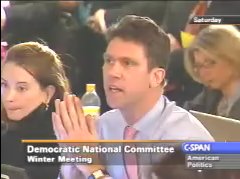 |
Reporter #11: Governor, to follow on that 'blind quote' thing you [inaudible] us on a minute ago. [inaudible] Republicans [inaudible] yesterday that having you as Chairman isn't quite as good as having Al Sharpton or Dennis Kucini--[the room erupts in laughter] ... but it's close. So, again, how do you counter that? Do you go out and--
Dean: First, the first way I'm gonna counter is just the way I countered that one-- I don't respond to blind quotes.
Will.
Reporter #12 ("Will"): Newt Gingrich had said that if Democrats had a death wish, Howard Dean's your guy. And that's-- his name is on the quote. [some chuckles] You wanna respond to that one?
Dean: Well, you know, I'm actually looking forward to the opportunity to see if we can prove Newt wrong.
Reporter #13: Governor, um--
Dean [to someone off to the side]: -- I'll take these two [inaudible]?
Reporter #13: Your predecessor Terry McAuliffe the other day, was complaining rather loudly about the politicization of the Catholic Church in the past election. About the priests who told their parishioners that it was a sin to vote for John Kerry. Do you think you share his concern? Do you think there's anything the Democratic Party should or could do about this?
Dean: Well, let me just say one thing about the church. I think the church is somewhat divided. There are leaders who spoke out very vociferously against our candidate for President. But I remember when I was campaigning in Iowa, there were many nuns who came up to me and said, "we're with you. Please keep doing this."
You know, the deal with the Catholic Church is that we have to remind Catholic Americans that the social mission of the Democratic Party is almost exactly the same as the social mission of the Catholic Church. You know that, the idear that it is easier for a camel to pass through the eye of a needle than it is for a rich man to get into the kingdom of heaven, is not a plank in the GOP platform.
So, it seems to me that we have the right to have a claim on Catholic votes, based on Catholic teaching. Part of our religious outreach is not gonna be solely evangelical Christians. We're gonna reach out to Americans of all faiths, and explain to them why it is that we think Americans who are deeply religious oughtta be supporting the Democratic Party, not the Republican Party.
[Points to a reporter] Last one.
Reporter #14: [inaudible] tax-exempt organization--
Dean: No, I haven't gotten any of that stuff. We can look into that later. But the general issue is not whether the tax exemption and all that stuff-- I mean, that's, that's a question for lawyers. The issue is, how do we get voters to vote for Democrats, and I think we have to be very clear about our message. We believe in social responsibility, and the Republicans have shown almost no indication that they do.
Reporter #15: Governor, the signature issue of your campaign was Iraq; you have virtually not mentioned Iraq during [inaudible] most Americans think the war was worth fighting after the election. Have you changed your mind, or if not, why aren't you mentioning--
Dean: First of all, I would beg to differ. I don't think the signature issue of my campaign was Iraq, I think the signature issue of my campaign was empowering people to stand up for what they believe in. I'm not gonna get into policy issues. You know, I think my views on Iraq are well-known. But I think that the day-to-day battles over what goes on in Iraq, the proper place for that is Congress and the Democratic leadership in Congress, and I don't see any need for me to make pronouncements about an issue that I won't be voting on anytime soon. My views are well known, I'm not gonna back away from my views, but I think most of the policy pronouncements are gonna be coming from the leadership of the Congress, not from me.
Thanks very much.
[He leaves]
Read the longer transcript
Transcribed from video provided by C-Span; in their recordings "American Politics: Howard Dean and Terry McAuliffe", and "Democratic National Committee Winter Meeting General Session," both dated February 12, 2005

.
.
 |
 |
